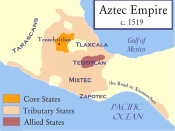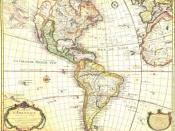A new conquest, a new era, and a new frontier are some of the many elements human civilization is no stranger to. Throughout mankind's existence on earth it has dealt with these complex and dynamic issues before, but what was about to take place was unprecedented and would in innumerable ways forever change the face of the planet. During the early 1400's three dominating societies, the Spanish, Aztec, and Inca empires conquered and quickly expanded their borders. The historical question arises in spite of this; did the newly acquired territory and subjugation of its people strengthen or weaken the political empires ability to fight the imminent conquest? In an almost paradoxical-like answer, while the expansion of their borders strengthened the civilizations externally, internally however dissenting ideas, bitter beliefs, and internal defiance, temporarily weakened the Spanish crown's control its colonies in the New World and ultimately led to the demise of the Aztecs, Incas.
What on the outside looked like a firm and robust imperialistic sovereignty was in actuality a hollow and fragile shell waiting to collapse.
Long before the Aztec and Incan civilizations rose to power, the Iberian Peninsula was divided into five kingdoms. Four out of the five would eventually join to become what is today now known as Spain. Spain was first conceived with the marriage of Isabella of Castile and Ferdinand of Aragon in 1469. About 32 years later Spain captured Granada during the Reconquest and in 1512 annexed Navarre. Throughout the Reconquest, the Christians used religion and holiness as a cause to spearhead for what in actuality was a battle for land and wealth. They would later on use the same stratagem for conquering the New World. While Spain's total dominance over the Iberian Peninsula, with the exception of Portugal, made it a power to be...



An interesting read.
This essay is well structured and full of bright remarks. A real pleasure to read.
5 out of 5 people found this comment useful.